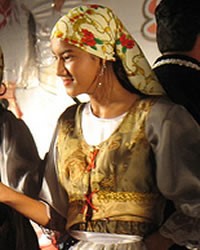Eurasian in Malaysia

Photo Source:
MySabah.com
Used with permission
|
Send Joshua Project a map of this people group.
|
| People Name: | Eurasian |
| Country: | Malaysia |
| 10/40 Window: | Yes |
| Population: | 66,000 |
| World Population: | 1,755,700 |
| Primary Language: | English |
| Primary Religion: | Christianity |
| Christian Adherents: | 60.00 % |
| Evangelicals: | 12.00 % |
| Scripture: | Complete Bible |
| Ministry Resources: | Yes |
| Jesus Film: | Yes |
| Audio Recordings: | Yes |
| People Cluster: | Southeast Asian, other |
| Affinity Bloc: | Southeast Asian Peoples |
| Progress Level: |
|
Introduction / History
Eurasians, a minority people group in Malaysia, are the descendants of the original Portuguese, British, and Dutch settlers who came with the colonial rulers of the early centuries. These settlers married native women and created a mixed race known as Eurasian, a term used by the British around 1820 to label people with a mix of European and Asian blood. The native Eurasian language was originally known as Christao (a variation of Portuguese with a heavy Malay influence). The present generation of Eurasians, however, do not speak this language. Many speak a local version of Malaysian English. Eurasian families are dispersed throughout the country. They do not dominate any region or state in Malaysia. Nevertheless, they are more concentrated in the urban areas of Malacca, Kuala Lumpur, and Penang.
What Are Their Lives Like?
During the colonial days, the influential Eurasians occupied many civil service jobs - positions usually offered to them because they were able to speak English fluently. Although they now lack outward presence in notable positions, a few Eurasian families continue to occupy positions in the middle class strata of Malaysia. A good number of Eurasians are still working in civil service positions, while others have made their presence in other occupations such as teaching, broadcasting, and working for newspapers. Many are making a living in the business world.
What Are Their Beliefs?
Eurasians are predominantly Roman Catholic. It is traditional for the Eurasian family to baptize a child within a month from birth and on the first Sunday of the month. Godparents, usually members of the family or good friends, are appointed and are morally responsible for the child's upbringing should anything happen to the parents.
Eurasian celebrations revolve around Christian holidays. Christmas is definitely the most important festival for Eurasians - even in the most humble of homes there will be a Christmas tree of some sort and presents from Santa Claus for the little ones. The Santa myth is so strong that children often leave a plate of biscuits and a glass of water out "in case Santa gets hungry."
In many Eurasian homes, certain rituals must be followed when a death occurs. For instance, they maintain that the spirit of the deceased remains in the house for several days. Thus, on the seventh day, a vigil is kept until midnight, at which time the spirit would give some sign of its departure before leaving the house. Some families leave a favorite beverage for the departing spirit. Although many of their beliefs are rooted in Christian traditions, few relate to a personal faith relationship with Jesus Christ.
What Are Their Needs?
Apart from some cultural differences and traditions, Eurasians have to work to earn enough to meet their needs just like other Malaysians. For this to happen, they require formal education and skills training to secure jobs. Pray that believers who would share the good news and that it will be received by those who may be trusting only in their Christian traditions.
Prayer Points
Pray for Eurasians in Malaysia to put all their identity in Jesus Christ.
Pray for the Lord to use Eurasians to draw Muslims in Malaysia to the King of kings.
Pray for them to understand their place in Christ's kingdom.